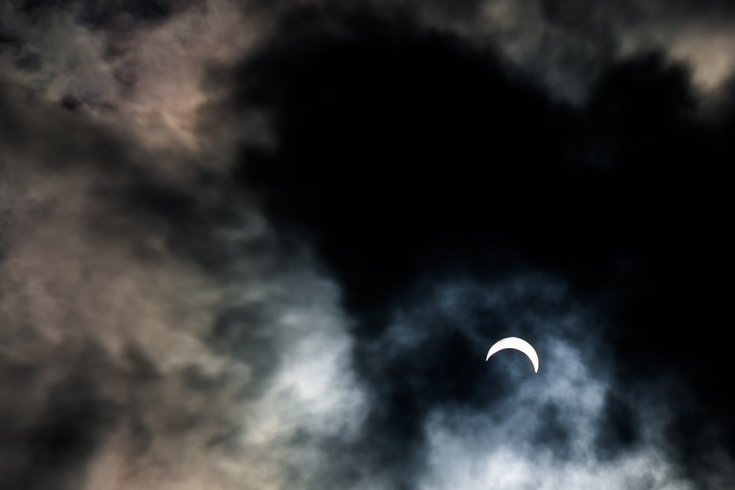
April 07, 2024
 Thom Carroll/For PhillyVoice
Thom Carroll/For PhillyVoice
Cloudy skies may obstruct views of the partial solar eclipse in the Philadelphia region on Monday, forecasters say. Above, the 2017 partial solar eclipse as viewed from Bellmawr, New Jersey.
People hoping to catch a glimpse of the partial solar eclipse in Philadelphia on Monday afternoon can expect to see a few clouds in the sky, too. At times, they may obstruct views of the moon passing between the earth and the sun.
"There will be some clouds in the sky, said Sarah Johnson, a meteorologist with National Weather Service in Mount Holly, New Jersey. "It's certainly questionable whether we'll have an unrestricted view."
MORE: Here's what to know about the partial solar eclipse visible in the Philadelphia region on April 8
In Philly, the moon will begin its path across the sun at 2:08 p.m., reaching 90% totality at 3:23 p.m. The partial eclipse will conclude at 4:35 p.m.
As of Sunday afternoon, the forecast calls for clouds to cover 30% to 40% of the sky during the eclipse, Johnson said. Cloud coverage is expected to increase after 5 p.m., but clouds could roll in sooner.
"Clouds will probably be increasing just after the eclipse happens, but it's very, very close," Johnson said. "It's definitely still up in the air if we will have an unrestricted view of the partial eclipse. It looks like, at this point, that the cloud coverage will happen more after the eclipse happens."
Cloud coverage is most likely to increase in areas to the north and west of Philadelphia, Johnson said.
This will be the first partial eclipse visible in Philadelphia since Aug. 21, 2017, when about 80% of the sun was covered. The region hasn't seen a solar eclipse with more than 90% coverage since Memorial Day weekend 1984, when there was 95% totality.
The next solar eclipse of this magnitude won't happen until 2045. Philadelphia won't experience a total eclipse until 2079.
People viewing the eclipse should wear specialized sunglasses to protect their eyes from damage, doctors say. Eclipse glasses are thousands of times darker than regular sunglasses and must meet an international standard, according to NASA. Solar eclipse glasses from 2017 can still work as long their lenses are not scratched.
People who look at the partial eclipse without adequate protection can burn the centers of their retinas, which help provide detailed vision. It's the same thing that can happen when looking at the sun on any day – the partial eclipse just gives people a reason to do something they usually wouldn't do.
"You end up with a small blind spot where you've burned a hole or burned a scar into the retina," Dr. Jeffrey D. Henderer, a professor of ophthalmology at the Lewis Katz School of Medicine at Temple University, told PhillyVoice last week.